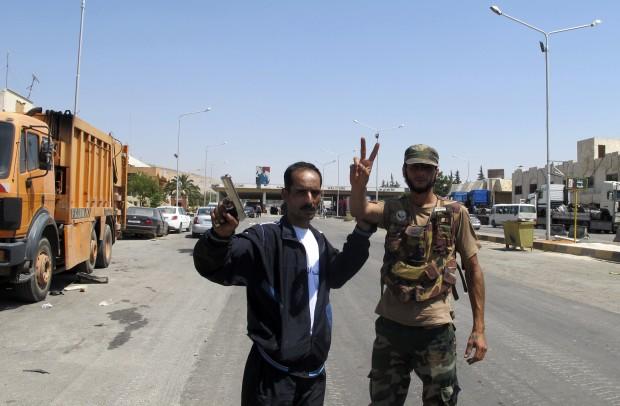Syrian rebels try PR training to present more moderate face to western countries
Members of the Free Syrian Army flash victory signs at a border crossing between Syria and Turkey at Jarablus, July 20, 2012. (Photo by Abdo via Reuters.)
In a small apartment in Antakya, Turkey, a small group of Syrian rebel fighters use their rest time to catch up on YouTube videos of other rebel fighting units, and news articles about the ongoing civil war back home.
The group understands that a large part of their battle is taking place in print and over the airwaves around the world. So they, like other units, have decided to get some public relations training before they rejoin their battalions in Syria.
Their goal is to make themselves more palatable to the West.
“They understand the idea that they must get help from the United States and from other countries. And by being sectarian and extremist they cannot get help. So they are trying to do something and say something so they can get help,” said one of their instructors.
He asked that he not be identified by name so as to protect his family in Syria.
He said several years spent in Canada and the United States have qualified him to teach the rebels how to win over the West.
As the violence in Syria enters its 19th month, the medley of Syrian rebel groups fighting against the regime have become more savvy in their appeals for international support. Among the network of activists helping the rebels, are those who monitor international media outlets and gauge support for forces trying to oust Syrian President Bashar Assad.
The 111 brigade is often pointed to as an example of a rebel unit that appeals to the West.
“We are a unique community of 140 fighters,” said their leader, Hajj Muhammed. “We are well-educated, with a mentality of ‘Syria for everyone.’”
In the face of what’s being called a civil war, Muhammed is eager to promote his unit as non-sectarian. He said it includes Sunnis, Shiites and even Alawites. The brigade’s unique name comes from idea of equality, he said — kind of “one for all and all for one.”
And when he sees that his audience includes female reporters, he is quick to point out that his unit also has female fighters.
In videos posted online, Muhammed showed his unit handing out food to Syrian refugees and assisting them in fleeing across the border. It’s an image of the rebel forces that he said is key to defeating Assad.
“We are the secular people who started the revolution,” he said. “If the free world would support us, they’ll get a free democratic country after we win. We’ll create a country that can live in peace with all our neighbors.”
The progressive face that Muhammed presents to the media is calculated, he admitted, to try and encourage aid from the West. Other rebel units have resorted to courting Saudi and Qatari sheikhs for money to fund their units, he said. But that money comes at the price of fighting by the rules of their religious Sunni backers.
“I haven’t received even a dollar from anyone,” he said. “And if I don’t get support from the West, I may be forced to move away from my liberal mentality and follow something else.”
Muhammed said he’s had offers from wealthy Islamists to drop the women and the multi-ethnic fighting unit in return for cash.
Until now, he said, he hasn’t accepted it.
Abdel Mahmoud used to be a fighter with Muhammed’s brigade, but he left after he was injured. And he’s critical of what he calls the media spin.
Sitting on the porch of the sunny apartment he shares with his family, Muhammed criticized the 111 brigade for trying to sell a progressive dream they can’t deliver.
“A lot of officers in the (Free Syrian Army) are pretending in front of the media to be secular,” he said. “But inside their hearts and their minds they are sectarian.”
He said that despite the pleasant face Muhammed shows the West, the reality is that the fighting in Syria is becoming increasingly motivated by dangerous sectarian divides.
After months of believing Muhammed’s own PR spin, Abdel Mahmoud said he realized that the rebels weren’t fooling anyone. Syria is increasingly becoming the kind of sectarian war the West was afraid of, he said, and there’s little chance anyone will believe otherwise.
And contrary to the rosy spin, he believes that no one knows what will become of Syria after their civil war.
Every day, reporters and producers at The World are hard at work bringing you human-centered news from across the globe. But we can’t do it without you. We need your support to ensure we can continue this work for another year.
Make a gift today, and you’ll help us unlock a matching gift of $67,000!
